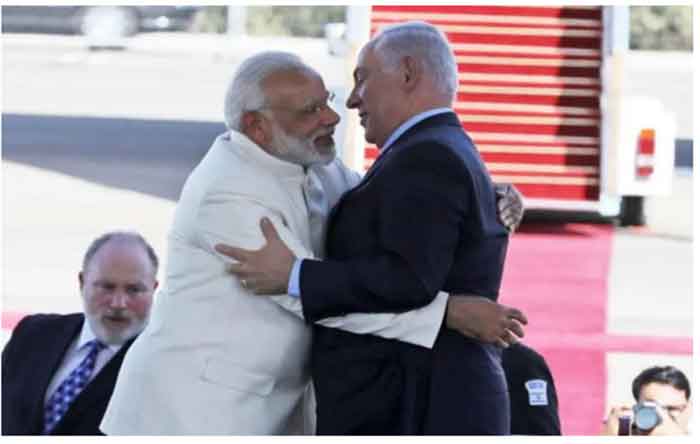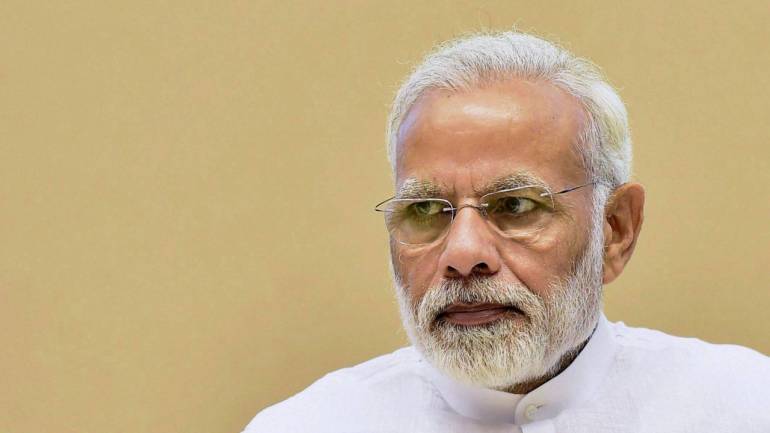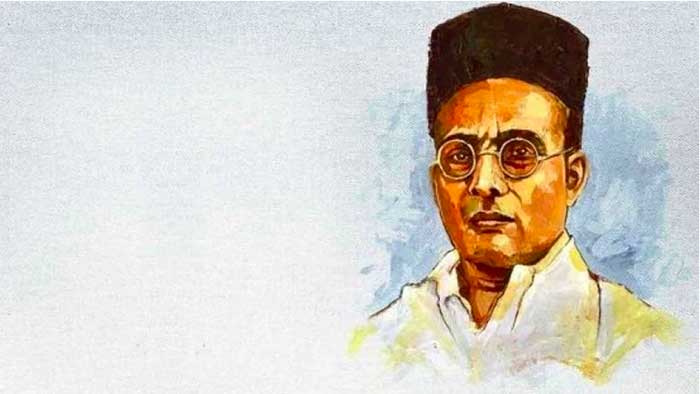
Our Prime Minister is fond of spreading the traditional Indian message of `Vasudhaiva Kutumbakam,’ welcoming the entire world as one family. But apparently, certain parts of the world are excluded from his hug – the gesture that he is so fond of extending whenever he meets foreign dignitaries. In his world of `Vasudha,’ it seems that there is no space for Gaza, where at the moment its people are being massacred by Israeli air bombing and ground attacks. India (or should we call it Bharat ?) abstained from voting for a resolution passed by the UN General Assembly on Gaza on October 27, calling for “immediate, durable and sustained humanitarian truce leading to a cessation of hostilities” and “protection of civilians and upholding legal and humanitarian obligation.” It refused to support the resolution because it did not condemn the Hamas terrorist attack on Israel on October 7. The criticism about the failure to condemn Hamas is fair enough. But should that be an excuse for rejecting an otherwise basic humanitarian appeal for the protection of innocent citizens of Gaza and an end to hostilities – an appeal that receives support from the vast majority of the UN members ? Isn’t India prioritizing the .case of the condemnable atrocious Hamas attack on Israel that killed over a thousand of innocent Israeli citizens, over the current ongoing Israeli air and ground attacks on Gaza that have already killed eight thousand innocent Palestinians ? It is not a question of counting the number of dead bodies, or quibbling over who first threw the stone. The urgent need is to put an end to the conflict by any means – diplomatic, behind-the-scenes negotiations, and give-and-take compromises.
Narendra Modi’s selection of kutumbas
In such a global scenario, the marginalization of Gaza in Narendra Modi’s Vasudha is a revealing example of his policy of choosing allies, and rejecting those whom he considers ineligible as kutumbas, or members of his family of Vasudha. This raises an important question. Is today’s Vasudha a unified world of members of the same family, described as kutumbas in our ancient Sanskrit texts to which Modi is harking back ? It is a multi-polarized world today – beset with conflicts between the US-led Western alliance and the Sino-Russian axis, among global powers in the arena of diplomacy, and devastated by armed conflicts among regional, religious and ethnic communities in different parts of the world. How is Modi choosing his kutumbas from this divided Vasudha ? He has selected the US from one of the disputant parties, and Russia from among its opponents, as his kutumbas – as evident from the bonhomie that he flaunted at the recently held G-20 world summit that he hosted in New Delhi. He is trying to put them on the same page of his foreign policy agenda, by inviting the US for investments in India’s military sector on the one hand, and reassuring Russia on the other with promises of continuation of trade and commercial deals. He is thus playing a game of keeping both the powers in good humour.
The other kutumba that Modi has chosen is Israel. He was quick to convey his sympathy to his counterpart in Tel Aviv, after the atrocious Hamas attack of October 7 that killed innocent Israeli citizens. But he took a lot of time to condemn what followed – the massive retaliation by Israel on the innocent Palestinian citizens of Gaza that amounts to a genocide. His tendency to prevaricate on controversies over Israel’s genocidal role against Palestinians, and delay in condemning Israel, are signs of his loyalty to his kutumba in Tel Aviv, on whom he has to depend for both overt operations (commercial deals) and covert operations (like importing spyware from Israeli intelligence agencies to hunt his political opponents within India).
There is however an ironical twist to Modi’s bonhomie with Netanyahu of Israel. Way back in 1939, his guru M.S. Golwalkar – by whose name he still swears – in his book We or Our Nationhood Defined, lauded Hitler’s policy of exterminating Jews, and recommended that a similar policy of `final solution’ should be adopted against Muslims in India. Till now, Modi has not announced in public his rejection of Golwalkar’s defence of the Nazi genocide of Jews. His new found love for Jews and shedding tears over their killing by Hamas have more to do with his government’s commercial and military intelligence related matters of dependence on Israel as mentioned earlier.
There could be another reason also – a convergence of similar strategies followed by Modi and Netanyahu. Both are strong adherents and practitioners of Right-wing religio-political ideologies in their respective states – Zionism in Israel and Hindutva in India. They share the common traits of intolerance of religious minorities (Arab Muslims in Israel and Indian Muslims in `Bharat’), suppression of political and social dissent (e.g. imprisonment of protestors), and destruction of the independence of institutions (e.g. Netanyahu’s judicial reforms to control the judiciary, and Modi’s parallel attempts to cripple the Indian Supreme Court by refusing to appoint judges recommended by its collegium). It is no wonder therefore, that given the convergence of their ideas, Narendra Modi will find a kutumba in Benjamin Netanyahu in his Vasudha.
Loss of some old kutumbas and alienation of others
But it is when dealing with some other members of the Vasudha, that Narendra Modi suffers from constraints. As for China and Pakistan, he has no problem is ousting these two neighbours from his family of kutumbas, given the long history of military hostilities with them with no sign of cessation in the near future, that make them shatrus, or enemies. But some of his kutumbas seem to drift away from him recently. While gaining a new soul mate like Netanyahu, Modi is losing some old kutumbas, and alienating a few other rulers in different parts of the Vasudha. Most disastrous is the loss of Canada’s Trudeau, one of his oldest kutumbas in the West. Canada, an important member of the US-led Western alliance that he is wooing, has come out with a serious allegation against his government’s secret agents, whom it accuses of assassinating a Sikh Canadian citizen. The ugly diplomatic row that followed the allegation, has not only left Modi red-faced, but is also threatening the future of hundreds of Indian students in Canada, who are facing uncertainties about their visa renewal.
Turning to the other parts of the Vasudha, we find that quite a lot of its states (including India’s neighbours) are no longer all that keen on retaining kutumbakam with Modi’s new-fangled state of Bharat, and drifting away in different directions. Sri Lanka for instance has allowed a Chinese spy ship to dock in Colombo – defying India’s objection. Bhutan has concluded a treaty with China on the controversial territory of Doklam, denying India’s claim to it. Modi recently tried to woo the Bhutanese King back to his camp of kutumbas during the latter’s visit to New Delhi. But beyond the usual diplomatic rhetoric of bon homie in official statements, Modi has not been able to win away Bhutan from China’s seductive embrace. To cap it all, the newly elected leader of the small island of Maldives has ordered the mighty Narendra Modi to remove his Indian soldiers from his country !
As for the West Asian states – the Arab governments and Iran – Modi’s relationship with them can be described as of a `half-kutumba’ sorts. While his government profits from commercial transactions with the Arab states and has signed a pact with Iran for collaborating on the setting up of the Chabahar Port, Modi is facing hostility from another quarter of the Arab world. Quatar has sentenced to death eight retired Indian Navy officials who had been working there as employees of a private company, on the charge of spying for Israel. It is yet to be seen how Modi uses his crafty skills to rescue these Indian citizens from the death row, and bring them back to India – a popular demand which is buttressed by the personnel of India’s armed forces.
`Bharataiva Dharma-Jati-Bhasha Bibhedanam’
As for domestic policy, instead of treating the whole of India as one family of kutumbas, Narendra Modi has made Bharat look like a nation split along religious, casteist, ethnic and linguistic lines. While shouting the slogan `Sab ke saath’ in his public speeches, at the same time he is allowing his nominee Birendra Singh as the BJP chief minister of Manipur to back his own upper caste Meiti community against the tribal Kukis – which has led to large-scale killing of members of the latter ethnic group. Modi has remained silent over their killing. Apparently, the persecuted Adivasi Kukis are not a part of Modi’s `Sab.’
There are behind the scenes operations by Narendra Modi also which are leading to the fracturing of the federal character of the Indian nation. He is appointing members of his own party BJP as governors in states ruled by Opposition parties. They are carrying out the BJP agenda of frustrating the efforts of these state governments to bring about reforms, by refusing to sanction their recommendations (in Kerala, Tamilnadu, Bengal, Punjab). His concept of `sab’ (all) therefore excludes the Opposition ruled states – a policy of exclusion which sabotages the basic federal spirit of our Constitution that guarantees rights to regional states.
As for religious and caste-based divisions, Modi’s agenda is being carried out by the goons of his political parent and patron, the Sangh Parivar. Incidents of lynching of Muslims by Hindu self-appointed cow-vigilantes, and of Dalits by upper-caste Hindu landlords have reached such an extent as to draw condemnation from international bodies like the UN Human Rights Commission. Most of these incidents have been traced to BJP leaders and activists. Narendra Modi is thus making Bharat stink in world public opinion. We can rename our country as Bharataiva Durgandham (Bharat as a bad smell) !
The other field where Narendra Modi is trying to sow the seeds of `bibhedanam’ is that of language. He is overturning the model of India as a multi-lingual country, which adheres to the practice of using English as a medium of inter-regional communication, as well as official discourse at the national level, and of co-existence of local languages as medium of instruction and communication at the regional level in the different states. He is determined to replace that model with a Hindi-based uniform linguistic pattern all over India, as evident from his latest attempts to rename the old nomenclature of the criminal manual (e.g. Indian Penal Code, the Code of Criminal Procedure and the Indian Evidence Act) in highly Sanskritized Hindi terminology, as Bharatiya Nyaya Sanhita, Bharatiya Nagarik Suraksha Sanhita and Bharatiya Saksha – words which are unpronounceable and incomprehensible for even a common Hindi-speaking Indian villager in north and central India, leave aside the vast masses in the south and the east. Quite understandably, the southern states have opposed Modi’s plan to impose Hindi on their culture and transactions in their legal operations.
Narendra Modi’s next target is the field of education. Here he is trying to divide the student community by imposing a teaching syllabus that legitimizes a hegemonic religio-political order of Hindutva in the style of teaching of the students, which alienates and antagonizes the religious minorities among them. The changes which have been made in the text books prepared by NCERT (National Council of Education and Research Training) for school students expose the anti-Muslim and pro-Hindutva bias of the BJP regime. For instance, in the new text books for students from Classes Seven to Twelve, released in April 2023, several quotations of Gandhi appealing for Hindu-Muslim unity (which were a part of the earlier NCERT syllabus) have been removed. Similarly, sections relating to periods of Hindu-Muslim amity during Moghul rule in the past have been eradicated. At the same time, the NCERT authorities have decided to keep the students ignorant of the widespread killing of Muslims in Gujarat in 2002 under the rule of Narendra Modi, the then Chief Minister of the state, and now India’s Prime Minister. They have removed from the old text a section that referred to that killing – a section which was meant to be a lesson to educate the students in the need to resist the spread of communal hatred, and prevent repetition of such tragedies.
What is shocking is the removal of a section relating to the assassination of Mahatma Gandhi by Godse, a fanatic from the Hindutva parivar. Justifying the decision to remove these sections from the text books, the NCERT director Dinesh Prasad Saklani states that it will lighten the work load on students, and thus “an unnecessary burden can be removed.” So, the information about the past of our history, which includes records of peaceful co-existence of different religious communities under Hindu, Buddhist and Moghul rule, is being disposed of as “an unnecessary burden” to be taken away from the knowledge of the new generation of students. The new text books are replacing the old comprehensive account of religious harmony that was based on these historical records, by an alternative account that highlights – and often exaggerates – the communal divide. They describe past wars over territorial occupation in terms of Hindu-Muslim conflict, ignoring the fact that the Muslim emperor Akbar sent his Hindu army commander Man Singh to conquer territories, that the Hindu Marhata king Sivaji had Muslim soldiers in his army when fighting the Moghuls.
What path of enlightenment is Narendra Modi opening up for the upcoming generation of young students ? His agenda of education is aimed at distorting their minds in a divisive direction of Hindu-Muslim antagonism – so that after they come out from their schools, they will be well-qualified to be recruited for the Sangh Parivar’s militant outfits like the RSS, Bajrang Sena, Vishwa Hindu Parishad, and other such murderous gangs.
Thus, when we look at the various segments of the present Indian scenario – social, administrative, judicial, educational – we face a dismal situation. If the fate of India is left in the hands of Narendra Modi, it will degenerate into a nation state that will be plagued by perpetual violent internal strife among religious, tribal and caste-based communities – a strife that is encouraged by the BJP leaders in the states that they rule (directed against Muslim and Christian minorities in central India, and against the Kuki tribals in Manipur).
Let us keep our fingers crossed over the future results of the 2024 elections. Will the Indian electorate vote for a divisive model of Bharataiva Bibhedanam that is fashioned by Modi, or for a unifying alternative model of Bharataiva Kutumbakam, that we hope can be set up by I.N.D.I.A ?
Sumanta Banerjee is a political commentator and writer, is the author of In The Wake of Naxalbari’ (1980 and 2008); The Parlour and the Streets: Elite and Popular Culture in Nineteenth Century Calcutta (1989) and ‘Memoirs of Roads: Calcutta from Colonial Urbanization to Global Modernization.’ (2016).















































